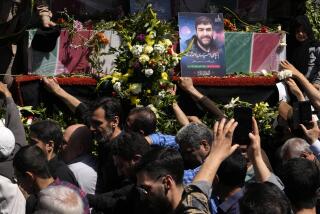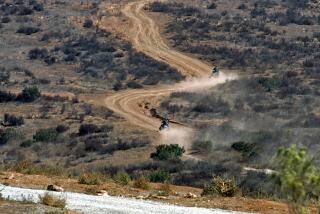Taliban Attack on Border Post Repelled, Iran Claims
- Share via
TEHRAN — Iran claimed Thursday to have beaten back an attack on a remote border post by Afghanistan’s ruling Taliban militia, saying Tehran inflicted heavy casualties in what would mark the two sides’ first armed face-off after more than a month of threats and saber-rattling.
But the Taliban dismissed the Iranian claims of a three-hour battle as propaganda, denying that any such engagement had taken place. And Iran’s report of fighting could not be verified independently because observers have been denied access to the border areas.
Even if some encounter did occur, it appeared doubtful by late Thursday that it represented the start of a much-feared war between Shiite Muslim-ruled Iran and the mainly Sunni Muslim Taliban. Iranian spokesmen said calm conditions had resumed all along the border between the two countries.
Iran and the Taliban, an extremist force that claims to be promoting the world’s purest form of Islam, have become bitter rivals over differences in their interpretation of Islam and charges that the Taliban--which controls 90% of Afghanistan’s territory--has oppressed the Shiite minority in its country.
Antipathy flared into open hostility last month after the Taliban admitted that its soldiers had killed eight Iranian diplomats and an Iranian journalist after conquering Mazar-i-Sharif, a northern stronghold of resistance to the Afghan militia.
Iran’s report of the battle Thursday came as a senior U.N. envoy was leaving Iran for Pakistan, where he hoped to meet with Taliban and Pakistani officials to try to defuse the danger of a regional conflict.
By making public the reported clash, one Western observer here speculated, Iran may have hoped to convince U.N. special envoy Lakhdar Brahimi, Taliban leaders in Afghanistan and their Pakistani friends that a real war is imminent unless the Taliban responds urgently to Iran’s demands for ending the crisis.
Tehran wants the Taliban to surrender 40 Iranian prisoners it holds and to put on trial and punish the soldiers responsible for the killing of the Iranian diplomats and journalist.
To back up its demands, Iran marshaled a force that it claims numbers 270,000 army troops and Revolutionary Guards along its eastern border with Afghanistan. Since last week, Tehran has been staging air and ground military exercises that appear intended to pressure the Taliban.
Iranian President Mohammad Khatami has repeated that his country strongly prefers a diplomatic settlement of the matter. But Foreign Minister Kamal Kharrazi warned Wednesday that Iran is willing to use force.
Meanwhile, Brahimi, the U.N. special envoy, was continuing his shuttle diplomacy to try to reduce the likelihood of a war breaking out between Iran and the Taliban.
After four days of talks with senior Iranian officials in Tehran, Brahimi said he felt more optimistic that “the threats of a regional crisis will lessen.” But he saw the accumulation of large numbers of troops from both sides along their mutual border as a potential powder keg.
According to the Iranian news agency IRNA, Thursday’s attack came when Taliban militia struck the Salehabad border post in Iran’s Khorasan province with mortar and machine guns.
Brig. Gen. Azizollah Jaafari, the ground force commander of the Revolutionary Guards, said that Iranian troops fought back for three hours and destroyed three Afghani border posts used by the Taliban, IRNA said.
Taliban spokesmen denied an attack took place.
In fact, commanders near the Iranian border have been instructed to “show restraint and not retaliate” even though Iranians have been raining artillery on Afghanistan the past three days, said Taliban militia spokesman Wakil Ahmad Mutawakel, quoted by Associated Press.
In Washington, a senior State Department official told a Senate hearing that he could not immediately confirm the Iranian report on the clashes. But Karl F. Inderfurth, assistant secretary of State for South Asian affairs, said he doubted such an incident would lead to an Iranian incursion.
If Iranian troops do cross the border and attack the Taliban forces, they may prevail at first through numerical superiority, but Afghan resistance would probably endure, Inderfurth said.
News of the reported clash between Iran and the Taliban prompted U.N. Secretary-General Kofi Annan to issue an appeal to both sides urging “maximum restraint” to avoid a confrontation.
In Tehran, most ordinary people seem opposed to getting into a war with the Taliban. Many fear Afghanistan would become a quagmire for Iran, as it was for the former Soviet Union for a decade after 1979.
More to Read
Sign up for Essential California
The most important California stories and recommendations in your inbox every morning.
You may occasionally receive promotional content from the Los Angeles Times.










